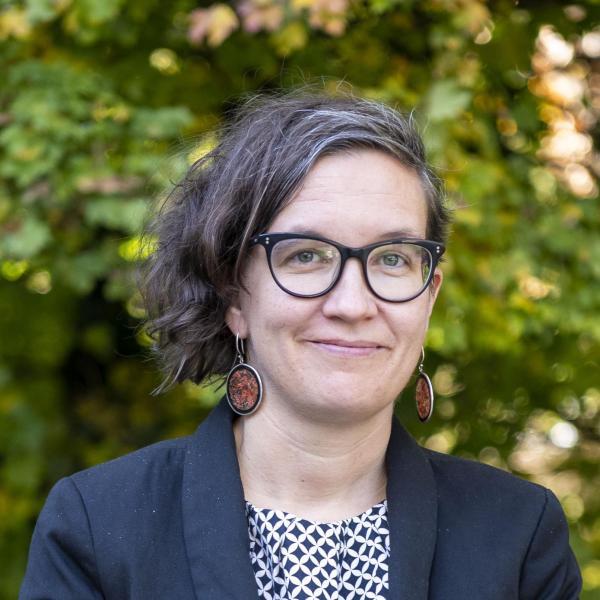Madlen Kobi

madlen.kobi@unifr.ch
https://orcid.org/0000-0001-6644-4083
-
Professeur·e assistant·e,
Département des sciences sociales
PER 21 bu. G325
Bd de Pérolles 90
1700 FribourgPER 21, G325
Biographie
Als Forschungsprofessorin an der Einheit für Sozialanthropologie leite ich seit Januar 2022 das Projekt "Urban Bricolage. Mining, Designing and Constructing With Reused Building Materials“. Das Projekt ist durch einen PRIMA-Beitrag des Schweizerischen Nationalfonds finanziert (CHF 1'149’189) und beschäftigt sich an der Schnittstelle zwischen Sozialanthropologie und Architektur mit den praktischen Herausforderungen der Wiederverwendung von Baumaterialien in ausgewählten europäischen Ländern. Mehr dazu auf meiner Website: urbanbricolage.ch
Bevor ich an die Universität Fribourg kam, arbeitete ich an der Accademia di Architettura der Università della Svizzera Italiana in Mendrisio (2017-2021), am Völkerkundemuseum der Universität Zürich (2015-2016) und am Institut für Sozialanthropologie der Universität Bern (2010-2014). Gastforschungsaufenthalte absolvierte ich an der Xinjiang Universität in Ürümqi, China (2011), am Max-Planck-Institut für ethnologische Forschung in Halle (2013/2014), am Institut für Technologie in der Architektur an der ETH Zürich (2020/2021) und am Department für Gebaute Umwelt der Aalborg Universität in Kopenhagen (2023).
Der Schwerpunkt meiner Forschungs- und Lehrtätigkeit liegt auf Mensch-Material- und Mensch-Umwelt-Beziehungen in der Stadt mit einem regionalen Fokus auf China und Europa. Weitere Bereiche meiner Expertise sind die Architekturanthropologie, Urbane Politische Ökologie, ökomodernistische Technologien und Infrastrukturen, Kreislaufwirtschaft und Abfallanthropologie.
Aufbauend auf meiner Forschung zu urbanen Klimaschutzmassnahmen und der Kreislaufwirtschaft von Baumaterialien bin ich davon überzeugt, dass der ökologische Wandel nicht durch isolierte akademische Forschung erreicht werden kann. Es braucht eine inter- und transdisziplinäre Zusammenarbeit um ein Verständnis dafür zu entwickeln, wie sich Städte und die sie prägenden Technologien zu einer gerechteren, widerstandsfähigeren und lebenswerteren Zukunft entwickeln können.
Die meisten meiner Publikationen sind auf ORCID zugänglich: https://orcid.org/0000-0001-6644-4083
Recherche et publications
-
Publications
40 publications
Circular Economy as Human-Material Relation. Understanding the Reuse of Building Materials through Historical Sources and Ethnographic Data
Kobi, Madlen and Przywara, Adam, ZZF – Centre for Contemporary History: Zeithistorische Forschungen (2025) | Article -
Publications
40 publications
Circular Economy as Human-Material Relation. Understanding the Reuse of Building Materials through Historical Sources and Ethnographic Data
Kobi, Madlen and Przywara, Adam, ZZF – Centre for Contemporary History: Zeithistorische Forschungen (2025) | Article -
Projets de recherche
Urban Bricolage. Mining, Designing and Constructing with Reused Building Materials
Statut: En coursDébut 01.01.2022 Fin 31.12.2026 Financement FNS Voir la fiche du projet Urban mining, or the practice of reusing and recycling waste materials within the city, is an important way to diminish the ecological footprint of European cities. Buildings in particular – through storage of CO2 and grey energy – have become the mines of the future. Instead of being thrown on the landfill, wood and steel, bricks, tiles and windows can be deconstructed, transported, and reintegrated into new buildings. To develop a framework for a circular economy in architecture is the objective of many recent design and academic initiatives. However, reusing building materials is still a niche phenomenon in the overall construction industry, mainly because of the high labour costs involved in deconstruction and the relative cheapness of new resources, but also due to the complicated logistics of shifting materials from demolition to construction site. At the intersection of anthropology and architecture, this project investigates the practical challenges of reuse. A new and radical socio-material perspective on reuse is not only key to understanding ecological and economic resistances within the circular building economy but also for finding methods to optimize the reuse process. In an innovative manner, this project combines architectural debates on the ecological requirements, technical possibilities, aesthetic reconfiguration, and material transformability of reused materials with an anthropological approach evolving along three research foci: 1) an actor-centred perspective that will scrutinize the practical and technical challenges that practitioners in the reuse sector face; 2) a theoretical engagement with the human–material relations in reuse architecture that will explore how the materiality of the handled objects – such as size, material qualities, composition, value, or separability – interferes in and complicates the reuse process; and 3) a contextualization of the European-based research findings within a larger historical and cross-cultural context. The objective of this comparison is to highlight the manifold motives and manifestations of existing reuse practices globally as they respond to local socio-political and economic contexts. Methodologically, the project uses ethnography to investigate reuse activities in four key field sites in European cities: at a reuse company, on the demolition site, in the architects’ office, and on the construction site. It analyses how scrap dealers, middlemen, bricklayers, architects, engineers, digital experts, company owners, and carpenters among others handle reused materials in their everyday lives, what resistances they face, and how they situate themselves within the circular economy. Knowledge will mainly be gained through learning on the ground, semi-structured interviews, oral histories, mapping, participation in workshops run by reuse institutions, and through gathering photographs and sound recordings. This project has both an academic and an applied relevance. In the first phase, the team gathers ethnographic data and embeds findings in theoretical debates that bring anthropology and architecture together, resulting in the editing of a special issue of an open access journal, several peer-reviewed articles, a PhD dissertation and one monograph as part of the Principal Investigator’s habilitation. In the second phase of the project, the team engages in academic and public activities to foster reuse practices in Switzerland and beyond. Among others, the podcast "Squaring the Circle" – produced by the team throughout the project and highlighting best practices in the reuse sector through interviews and visits to reuse sites – will help in reaching out to non-academic audiences, as will a policy paper on practical challenges inscribed in the circular economy.
